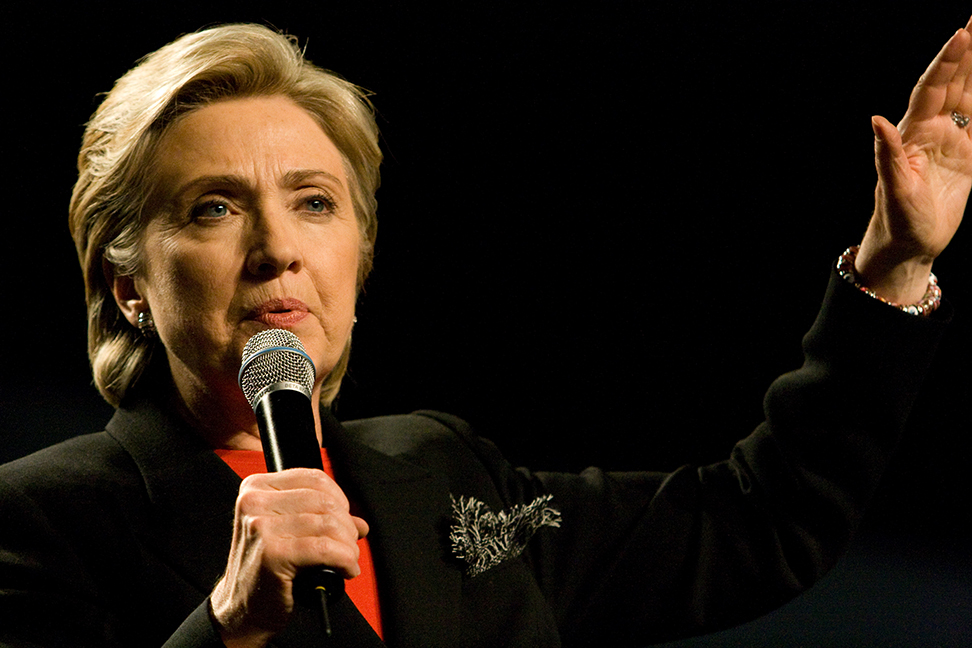As Donald Trump’s campaign for president has floundered, burning through management on pace with the Cleveland Browns, Democratic nominee Hillary Clinton has adopted a clear strategy: Move to the center and win over anti-Trump Republicans. Trump, according to Clinton, does not represent what the GOP stands for — he’s an invader, dragging in an unsightly horde of bigots who have tainted an otherwise noble and decent party. The Democratic nominee made this clear in a recent viral tweet-storm — oh, the joys of 2016 politics — where she wrote she was “honored to have [Republicans’] support.” In some regards, this approach has paid off, as Clinton has netted endorsements from numerous top Republicans.
But is this really the best route for Clinton to take? For one, voters on the right aren’t too fond of her. At any given point during the past year, 10 to 15 percent of Republicans have held a favorable view of Clinton, according to a July Gallup poll, and that’s trended downward recently. Despite the chaos of Trump’s campaign, he still enjoys a 70 percent favorability rating among Republicans. And even if Clinton does win over some conservatives, the benefits may not carry over to state and local races — in a recent poll, 47 percent of likely Clinton voters said they might split their ticket, compared to 40 percent of likely Trump voters.
More importantly, there’s the matter of what Clinton sacrifices with this approach. As many pundits before me — including Diamondback columnist Leslie McNamara back in March — have noted, Trump is not a fluke, but the logical conclusion of decades of Republican planning. Since the civil rights movement, the party has embraced a philosophy known as the Southern Strategy, which cloaks bigotry in common rhetoric to win over the center while still appealing to the far right. The racism of the GOP never went away; it just hid inside dog-whistle terms such as “welfare queens” and “inner-city men.” Then Trump came along, ditched the dog whistle in favor of a bullhorn and rode a wave of lurid bigotry to the nomination.
Trump’s approach has a critical flaw, though: While the right has supported and will continue to support him, the center has been less obliging. This is where Clinton could capitalize. If she made it clear that Republican leaders of all stripes bear the blame for Trump, she could sound the death knell for the troubled party. Trump has become a toxic force in American politics, destroying the credibility of everything he touches, which explains why his enablers and predecessors have tried to disavow him. Clinton shouldn’t grant them that privilege.
Take the three examples Clinton cited in the aforementioned Twitter thread — 1996 presidential nominee Bob Dole, former President George W. Bush, and 2008 presidential nominee John McCain. Instead of praising Dole for telling racists to leave the Republican Party, why not censure him for the anti-immigration platform he proudly ran on? Instead of reminiscing about Bush’s speech in support of Muslims after 9/11, why not bring up literally anything else from his presidency? Instead of recognizing that McCain called his opponent Barack Obama “a decent person,” why not mention that he preceded that comment with Trump-esque fear-mongering about Democrat-sponsored terrorism? All of them paved the way for Trump’s ascension, and elucidating that for voters in the center would drive them further from the GOP.
Compare that to the alternative. At this point, the turmoil in Trump’s campaign will likely prevent him from winning; the anti-Trump Republicans with whom Clinton has curried favor won’t move the needle by much. And following 2016, most, if not all, of them will defect back to their original party. Fast-forward to 2020: The GOP, learning from its mistakes, has nominated someone who combines Trump’s right-wing populist charisma with actual political savvy and far less baggage. In this hypothetical re-election campaign, Clinton may have her work cut out for her. Remember, she leads Trump by a fairly narrow margin despite all of that pandemonium — so what happens when she has to go up against an actual politician?
In the short term, pivoting toward the center, like many candidates do in a general election, may strike Clinton as a viable strategy. In the long term, however, it would best serve Clinton to show her enemies no mercy. Although many of his colleagues in the party may deny it, Trump represents the GOP perfectly. By laying that out for everyone to see, Clinton cruises to the White House and increases her chances of staying there.
Ryan Romano is a sophomore journalism major. He can be reached at tripler26@gmail.com.



